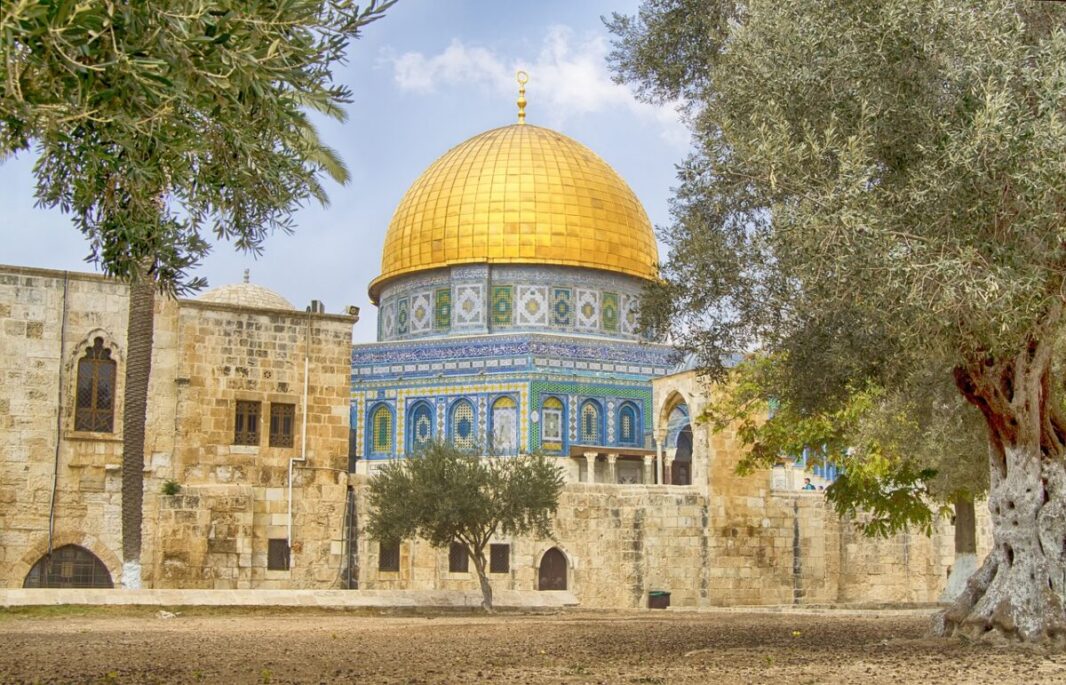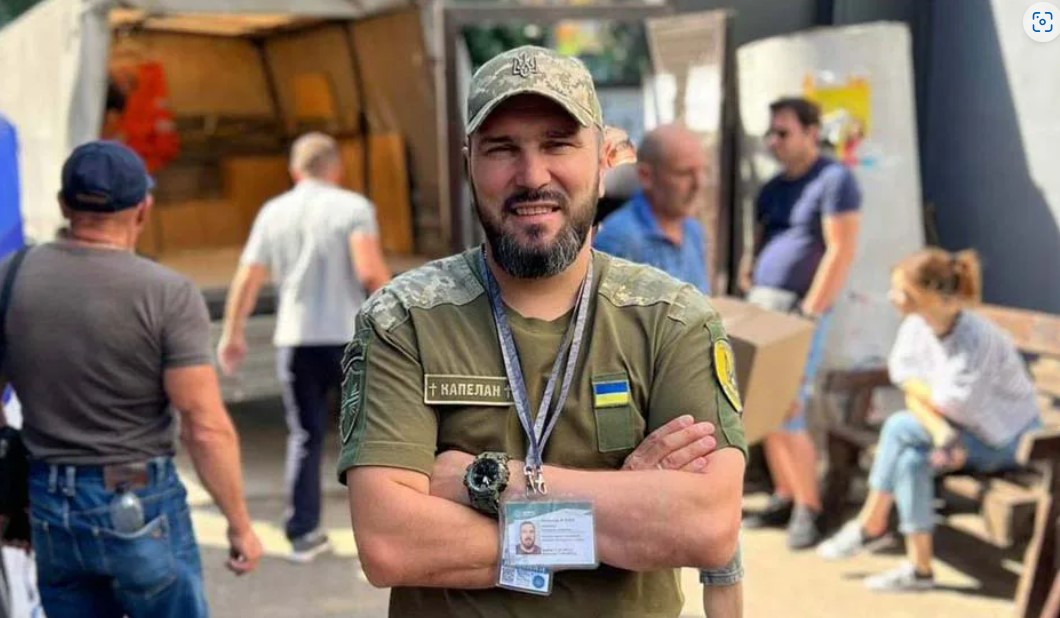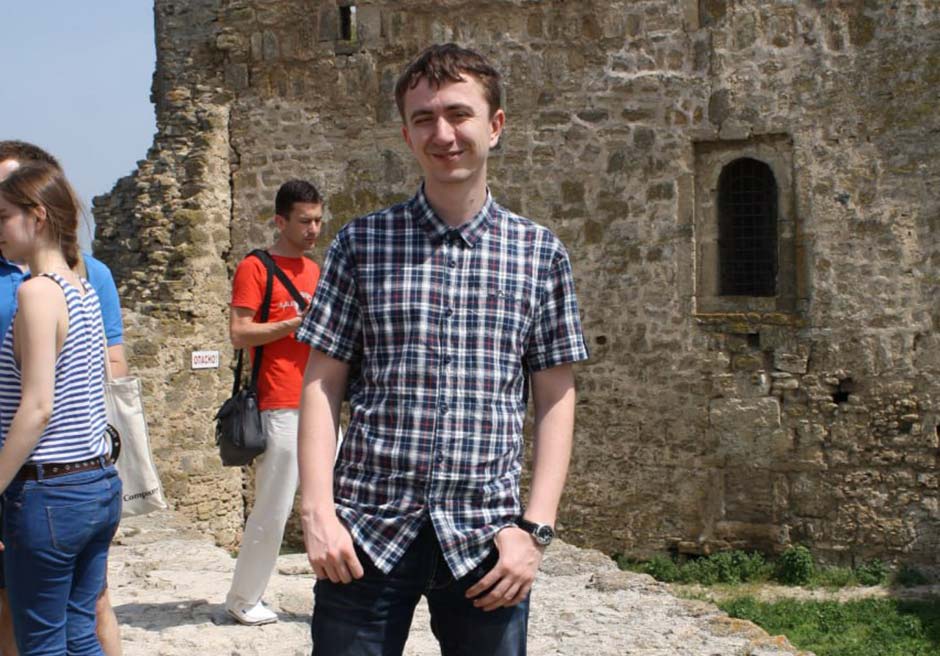THE MESSIANIC COMMUNITY IN UKRAINE BEFORE THE FALL OF COMMUNISM
The Messianic community has been active in Ukraine for many decades. In the early twentieth century, much of what is now Ukraine was part of the Russian Empire or Soviet Union. Some of Ukraine’s most influential cities, including the capital, Kiev,[1] and the major port city, Odessa, were in Russia at that time.
The Ministry of Leon Rosenberg in Odessa
The earliest Messianic Jewish ministry in Ukraine was likely the work of Leon Rosenberg. In the early 1900s, he and his wife moved to Odessa where they opened a bookstore to sell Bibles and other literature about Jesus. In the store’s windows, they placed Scripture verses and a placard in Yiddish about their mission. Though they faced opposition from local rabbis, many Jewish people were curious to learn about the New Testament.[2]
Soon, Rosenberg began leading home Bible studies. This ministry was risky because the Russian government took swift action against any “meetings” they deemed might lead to political dissent. Plus, any religious activities outside the Russian Orthodox Church were strictly regulated. Despite the challenges, Rosenberg went on to found a Messianic congregation (called a Hebrew Christian church at the time). He also started a school for Messianic children. Rosenberg and his congregation produced a Messianic songbook that combined Jewish music with praise for Jesus.[3]
World War I broke out in 1914, and religious persecution came with it. Like many ministers, Rosenberg was exiled to Siberia. However, thanks to some influential friends, he was freed shortly afterward. The Russian Revolution of 1917 also caused immense suffering. After narrowly escaping execution, Rosenberg was exiled from Russia.[4] He first moved to Germany, but during World War II, he went to the United States where he founded the American European Bethel Mission.[5]
The Ministry of Peter Goroditch in Kiev
Kiev has proved to be an especially fruitful city for the gospel. Peter Goroditch, a Jewish believer, opened a soup kitchen in Kiev in 1917. Many of those he served were refugees who fled to Kiev during the Russian Revolution. With the help of some local Messianic Jewish people, he opened a ministry center and started religious services. Every week, many attended the meetings. In 1918, the government granted public sanction to the ministry (rights given to religious groups).
Less than a year later, as World War I continued, the Germans reached Kiev and evicted Goroditch. It seemed there was no way to revive the ministry. But Goroditch’s sister decided to sell the part of the property she owned with him, and they used those funds to help secure a new house for the ministry. Goroditch’s work was generally well received among the local Jewish community, the Russian clergy, and the press. However, this Messianic community faced immense challenges with war raging in Kiev and with the shelling of their ministry center on more than one occasion. Still, the gospel went forth.[6]
Soviet Persecution
By the end of the 1920s, the Soviet government had suppressed all religious activity. Modern historians describe the Soviet attack on religion as “almost seventy years of continuous persecution, unprecedented in history in intensity.”[7] The Messianic community deeply suffered the effects of this persecution.
At that time, the American Board of Missions to the Jews, as Chosen People Ministries was known then, was also involved in ministry in the Soviet Union. In 1929, one of our staff members, Gregory Guberman, oversaw a ministry center in Dniepropetrovsk, a city in Russia near the Ukrainian border.
The Soviet government seized this center the very year it opened. Guberman knew the risks, but he continued ministry as much as he was able. He met with people who had attended services at the center. But after 1930, no one heard from him again. Like so many other believers, he was likely killed or exiled to Siberia for his faith.[8] Following World War II, Westerners were banned entry. Open ministry in the Soviet Union was not possible again until the late 1980s. Yet, even during that dark time, God was at work. Indeed, one of the most well-known pastors of the underground Church in the Soviet Union, Richard Wurmbrand, was a Jewish believer.[9]
THE MESSIANIC COMMUNITY IN UKRAINE AFTER COMMUNISM
For decades, people in this region were barred from religious activities. When the restrictions finally loosened, many were open—even eager—to talk about God.
Rekindling Ministry in Ukraine
After the fall of communism, Ukraine was the setting of a huge revival. The city of Kyiv has played an especially great role in this movement. Chosen People Ministries was the first organization to officially restart a ministry to Jewish people in the soon-to-be-former Soviet Union. In 1989, as this part of eastern Europe was becoming more open to Westerners, Sam Nadler and Albert Davis visited Russia.
Nadler would become president of Chosen People Ministries in 1991, and Davis was a Jewish believer from Georgia (the country) who had settled in Canada. It was in Kyiv, however, that they found people most receptive to the gospel. They preached on Romans 1:16 at a church. In this verse, Paul wrote that the gospel is “to the Jew first.”
The pastor invited them to return, and Nadler and Davis gladly did. That Sunday, so many Jewish visitors came that the regular attendees gave up their seats. More than seventy of these visitors came to faith.[10] Before leaving, Nadler and Davis organized a Bible study for the new believers. Not long after, Chosen People Ministries founded Beit El Gibbor (House of the Mighty God). There had not been a Messianic congregation in the region for decades. Beit El Gibbor eventually dissolved but was reborn under the name Life in Yeshua.
Revival in Ukraine
An amazing revival took place in eastern Europe in the 1990’s. This revival was by far the strongest in Ukraine. David Sedaca, a long-time Chosen People Ministries staff member, visited Kyiv in 1996. He remembers spending nine or ten hours a day teaching at churches and training pastors. There was simply an intense hunger for God. Part of this hunger likely had to do with the end of Soviet laws against religion. People could finally explore faith openly.
Vladimir Pikman, who currently leads our partner ministry in Germany, came to faith in Kyiv in 1992. He vividly recalls the immense interest in God among both Jewish and Gentile people. “There was no need for evangelism,” he observes.[11] That is, believers did not have to make an effort to share the gospel because so many non-believers took the initiative to attend services or ask about the Scriptures.
Here is one example of the dramatic growth of the Messianic movement in Ukraine. In 1994, American Messianic believer Jonathan Bernis visited Ukraine. He hosted a series of music and worship festivals. More than 40,000 people attended these events. Bernis’ outreach led to the creation of the Kiev Messianic Jewish Congregation. This Messianic congregation grew to be the largest in the world, at least before the current Russian invasion. At its height, it had about 2,000 members. Its leader is Boris Gricenko. He came to faith in the late 1980s while on a business trip in Estonia. Gricenko participated in Bernis’ music festivals, and soon afterward, he accepted the invitation to be the rabbi of the new Messianic congregation in Kyiv.[12] He has remained in that position ever since.
The Independent Messianic Community in Ukraine
All these Westerners helped rekindle the Messianic community in Ukraine. While communism put an end to the ministry of believers like Rosenberg and Goroditch, help from the body of Messiah in other countries revived the vision of these workers. Nadler, Davis, and Bernis taught the gospel “to the Jew first” and encouraged these believers to maintain a Jewish identity (Romans 1:16). So many Ukrainians came to faith that they soon took on leadership roles in the Messianic community—as teachers, cantors, worship leaders, and more.
Not only that, but many Ukrainian believers have moved abroad, especially to Israel or the United States, where they have brought the good news with them and have shaped the global Messianic community. Michael Zinn, who leads our partner ministry in Israel, is from Ukraine. He estimates that 65 percent of Israel’s Messianic Jewish believers are from Russia or Ukraine.[13] Most Jewish people in Germany today are from the former Soviet Union, and about 80 percent of the German Messianic community come from this region. Several Chosen People Ministries staff members and partners are from Ukraine as well.[14]
In the twenty-first century, most Messianic congregations in Ukraine are independent. They are not formally connected with an external organization. Still, many have participated in networks like the International Messianic Jewish Alliance. Chosen People Ministries has been assisting Ukrainian congregations for decades. Our staff have provided training, fellowship, and accountability. When needed, we have given material aid as well. For years, we hosted seminars for congregational leaders. The last seminar we led was in November 2021.
The Russian Invasion and the Messianic Community
The Messianic community, like the rest of Ukraine, has greatly suffered during the Russian invasion of 2022. Many of those who were part of Messianic congregations have fled to the western part of Ukraine. Through social media, these believers have been able to connect with one another. Several have taken shelter together. These believers have little or nothing except the clothes on their backs. Chosen People Ministries has given significant aid to sustain this community, including food, clothing, diapers, and medicine. Read more about our work and support us here.
Some Messianic believers have also fled the country. Many have gone to Israel, especially if they already have family there. Others are in nations near Ukraine as they try to rebuild their lives. In short, the situation is tragic as they are forced to leave their homes and sometimes husbands behind. Still, the faith and resolve of these suffering Ukrainian believers shines in these dark days. It is also amazing to see the unity among the body of Messiah in helping the refugees. This fact greatly impressed one of our Ukrainian-born staff members who has been working nonstop to aid refugees. He noted that he has “never seen such unity among Christians of all denominations helping both Jews and Gentiles to escape the atrocities of the war.”[15]
CONCLUSION
No one knows how or when the war will end. In any case, it will take years to rebuild Ukraine. Many people have lost everything—family, home, livelihood, and community. The effects of this conflict will ripple for decades. Only time will reveal what will become of the Ukrainian Messianic movement. Whatever happens, we can trust that God never forsakes His people.
“When you pass through the waters, I will be with you; and through the rivers, they will not overflow you. When you walk through the fire, you will not be scorched, nor will the flame burn you. For I am the Lord your God, the Holy One of Israel, your Savior” (Isaiah 43:2–3b).
NOTES
[1] We spell this city’s name as “Kiev” when discussing it before the end of the Soviet Union. Afterward, we spell it as “Kyiv” to reflect the Ukrainian pronunciation.
[2] Vera Kuschnir, Only One Life: A Story of Missionary Resilience: Biography of Leon Rosenberg, the Late Founder and Director of the American European Bethel Mission (Broken Arrow, OK: Slavic Christian Pub., 1996), 145–57.
[3] Kuschnir, Only One Life, 188–93.
[4] Kuschnir, Only One Life, 206–9, 234–35.
[5] Lidiya S. Tonoyan, “Messianic Jewish Movement in Ukraine” (Master of Arts, Baylor University, 2011), 15.
[6] Mitchell Glaser, “A Survey of Missions to the Jews in Continental Europe, 1900–1950” (Diss., Pasadena, CA, Fuller Theological Seminary, 1998), 98–100.
[7] Dimitry V. Pospielovsky, Soviet Studies on the Church and the Believer’s Response to Atheism, vol. 3, A History of Soviet Atheism in Theory and Practice, and the Believer (Basingstoke, Hampshire: Macmillan Press Ltd., 1988), ix.
[8] Harold A Sevener, A Rabbi’s Vision: A Century of Proclaiming Messiah: A History of Chosen People Ministries, Inc. (Charlotte, N.C.: Chosen People Ministries, 1994), 155–58.
[9] Glaser, “A Survey of Missions to the Jews in Continental Europe, 1900–1950,” 203.
[10] Sevener, A Rabbi’s Vision, 585–87.
[11] Vladimir Pikman and David Sedaca, interview by Rachel Larsen, March 28, 2022.
[12] Tonoyan, “Messianic Jewish Movement in Ukraine,” 51.
[13] Michael Zinn, interview by Rachel Larsen, April 1, 2022.
[14] Vladimir Pikman and David Sedaca, interview by Rachel Larsen, March 28, 2022.
[15] ”Ministry News Briefs from around the Globe,” The Chosen People, April 2022.
Source: History of the Messianic Community in Ukraine – Chosen People Ministries










